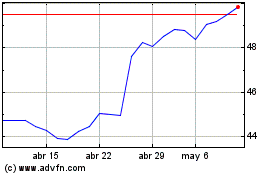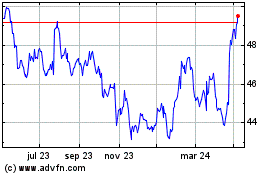Investors Call for End to Soybean-Driven Deforestation
07 Marzo 2019 - 9:10AM
Noticias Dow Jones
--Investors representing $6.3 trillion have asked companies to
eliminate deforestation in their soybean supply chains
--Letters were sent to 25 companies sourcing soybeans from South
America
--At least 7% of global soybean crop expansion caused
deforestation between 2012 and 2015
By Dieter Holger
Investors representing $6.3 trillion in assets are calling on
companies to eliminate deforestation in their soybean supply
chains, demanding time-bound targets and more transparency.
Some 57 investors sent a letter, organized by investor advocacy
group Ceres, to 25 companies that source soybeans from South
America, which produces more than half of the world's soybeans
according to Spain's University of Navarra.
"Companies that source soy products grown in South America are
exposed to a number of deforestation-related business risks," the
investors said.
These include reputational risks as consumers become aware that
a company's supply chain is linked with deforestation, land and
labor rights issues, and operational risks from potential changes
in local climate and falling agricultural yields, the investors
said. Further considerations include regulatory and litigation
risks, and market access risk, they added.
At least 7% of global soybean crop expansion caused
deforestation between 2012 and 2015, according to a study from
Transport and Environment.
Soybean-caused deforestation threatens forests, which serve as
so called carbon sinks and soak up CO2 emissions, Ceres said.
"Effective management and reduction of deforestation by our
investee companies in their agricultural supply chains, such as
soybean, is critical to reducing our portfolio exposure to climate
change related risks," said Beth Richtman, managing investment
director of sustainable investments at the California Public
Employees' Retirement System, the largest pension fund in the
U.S.
The investors said the companies need to set time-bound targets,
disclose their deforestation policies and publish data on where
their soybeans come from.
"While we recognize the important role of agriculture and
soybean production to economic development and the livelihoods of
farmers, we are also concerned that the environmental and social
issues associated with unsustainable soybean production could have
a material impact on companies that source the commodity," the
investors said.
Ceres didn't name any of the 25 businesses that were
targeted--but agriculture companies Archer Daniels Midland Co.
(ADM) and Bunge Ltd. (BG) responded to the letter.
"The recommendations of the investor letter overlap in important
ways with elements of Bunge's current approach to sustainable soy,"
said Stewart Lindsay, vice president of sustainability and
government affairs at Bunge.
Mr. Lindsay said Bunge already has board oversight on the issue
and aims to achieve a deforestation-free supply chain by 2025.
"We will continue to enhance our own work, and will collaborate
with peers in the industry," Mr. Lindsay said.
ADM is currently refining the accuracy of where it sources
soybeans and has a policy of not buying the commodity from high
carbon stock forests, which absorb large amounts of CO2, according
to its 2018 Soy Progress Report.
"We are committed to working with shareholders, industry
counterparts, producers, governments and other stakeholders to do
our part to protect the environment and people of South America,"
said Alison Taylor, chief sustainability officer at ADM.
Unilever PLC (ULVR.LN), which owns brands that use soy but
didn't receive the letter, said it will publish more data on its
soybean supply chain this year.
"We agree that more needs to be done to end deforestation," a
spokeswoman said.
Write to Dieter Holger at dieter.holger@dowjones.com;
@dieterholger
(END) Dow Jones Newswires
March 07, 2019 09:55 ET (14:55 GMT)
Copyright (c) 2019 Dow Jones & Company, Inc.
Unilever (EU:UNA)
Gráfica de Acción Histórica
De Mar 2024 a Abr 2024

Unilever (EU:UNA)
Gráfica de Acción Histórica
De Abr 2023 a Abr 2024
